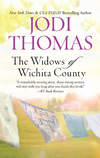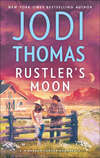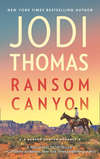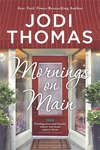Loe raamatut: «The Widows of Wichita County»
Praise for the novels of
JODI THOMAS
“One of my favorites.”
—Debbie Macomber
“Packs a powerful emotional punch….
Highlights the author’s talent for creating
genuinely real characters…. Exceptional.”
—Booklist
“Jodi Thomas is a masterful storyteller. She grabs your
attention on the first page, captures your heart, and
then makes you sad when it is time to
bid her wonderful characters farewell.”
—Catherine Anderson
“Fantastic… A keeper!… A beautiful story about
unexpected love. An exceptional storyteller, Thomas
has found the perfect venue for her talent, which is as
big—and as awe-inspiring—as Texas. Her emotionally
moving stories are the kind you want to go on forever.”
—RT Book Reviews
“Jodi Thomas paints beautiful pictures with her words,
creates characters that are so real you feel as though
they’re standing next to you, and she had a deliciously
wry sense of humor… Thoroughly recommend it.”
—The Book Smugglers
“A fun read.”
—Fresh Fiction
The Widows of Wichita County
Jodi Thomas

A special thank you to…
My two coffee drinking buddies at the donut stop
who told me tales of the early oil days and set the
background for this story. Thanks Norman Dysart
and Bob Izzard. I love you both.
Thanks to a wonderful professor and nurse at
West Texas A&M University who spent
one rainy afternoon teaching me about burns.
Thanks, Debra Davenport.
To Jay Wilson, a friend and a pharmacist
who answered endless questions. Thanks Jay.
To Natalie Bright and the wonderful ladies of the
Desk and Derrick Club. Thanks for your support.
A special thanks to my cheerleaders in Houston
who’ve been with me from the first as I told stories of
books to come. Thanks TESA ladies.
To the Panhandle Plains Historical Museum and to
Cornette Library on the West Texas A&M University
campus. Thanks for giving me a home.
Contents
Prologue
Begin Reading
Prologue
The last day of August
Clifton Creek, Texas
Randi Howard pressed the fold in the marriage license with one long ruby-red fingernail and slipped it into her huge leather purse.
“Good luck with this one,” the clerk said without smiling. “Sorry we misspelled your name and you had to come pick up another copy.”
Randi waited for her to add, “see you again in a few years,” or “I’ll remember it’s i next time around.” But the clerk moved away without another word.
Suddenly in a hurry to leave the aging courthouse, Randi pivoted on the heels of her red boots, letting the fringe of her jacket fly. The place gave her the creeps; everything echoed off the scrubbed floors and pale marble.
“There won’t be a next time,” she whispered to herself as she patted the license hidden away in her purse. “I swear on my mother’s grave—if she has one by now.”
She hit the latch on the door at full speed, letting her long legs carry her straight into the wind and toward Jimmy’s truck parked half a block down at the café. He would be her salvation this time. He would live with her long enough for the glue of marriage to stick. She would be thirty in two years and she planned to be married, not looking for husband number four. At best, Jimmy would make her happy. At least, he would stay around.
Which was more than she could say for the last two good old boys who had also swept her off the bar floor and into a wedding bed. By the time she’d changed the sheets, they were gone.
But Jimmy had promised to give it a good try. He owned his own trailer home outright. He had a good job and a rich uncle. No one in town had a bad word to say about him and, in the three months they had lived together, he had not hit her once. That, for Randi, was some kind of record.
She closed her eyes against the sting of the wind whirling dust devils across the West Texas parking lot. This time, if the marriage failed, she would have no one to blame but herself. Jimmy was solid and kind. He married her even after everyone in town tried to talk him out of it. He drank a little, but then she usually finished at least two beers by the time she spread on her makeup. And he loved her. At least she thought he did. He told her so once and once seemed enough.
Randi slowed as she passed the long windows of the town’s only bank. Her image reflected back at her from the smoky glass. Wild red hair, too much eye liner for daylight, Western clothes cut tight to show off her endless legs and square shoulders. Randi smiled. She was a bar light beauty and she knew it.
A woman inside the bank stepped to the window. For a moment, their images blended and both looked through the other. They stood, the smoky glass separating them, seeing only themselves.
Randi blinked, almost crying out as the fine young woman’s expensive clothes and regal carriage mingled with her own frame. She wore breeding and grace for the first time in her life. For one instant, she saw another Randi, one that might have been or maybe one that might yet be. She saw a lady, not a throw away cowgirl who had to fight sometimes just for the right to keep breathing.
Finally, Randi raised her gaze to the beautiful woman’s huge dark eyes.
Truth delivered a solid kick in her gut.
The lovely woman in the expensive clothes had looked at Randi and must have seen the same blending of images. She saw what she might become if she continued to live in Clifton Creek. Only unlike Randi’s pleasure, the lady appeared horrified.
Unable to stare a second longer Randi ran toward the café, wiping tears she blamed on the dust away from her cheek. “What’s wrong with me?” she swore under her breath. “I’m married to Jimmy Howard now. I’m going to be happy. Ain’t no sense in wanting what you can’t have.”
She kicked at a dandelion fighting its way through the crack in the sidewalk. “I should have been born a plant. I wouldn’t care if I was a flower or a weed. Plants don’t care if they’re wanted or loved, they just grab ahold of the earth and grow.”
Opening the café door Randi straightened to her full height. Without caring that folks watched, she ran to Jimmy, straddled him like he was a kitchen chair and kissed him long and hard.
She would survive in this town even if she had to grow through the cracks in the sidewalk. Nothing better was coming along. Tired of wandering without a compass, she planned to take root right here in Clifton Creek.
Half a block down the street Anna Montano stepped out of the bank and walked toward a waiting Range Rover. Even her tailored clothes and grace of movement could not hide the doubt coursing through her body as she regarded her new hometown.
Clifton Creek, Texas, had to be the ugliest place on God’s planet. The very air smelled of cow manure. She had left a beautiful country villa in Italy surrounded by rolling land rich in color and entered a world painted only in brown hues. A Coming Soon Wal-Mart sign was the most colorful thing in this place named after a creek that had dried up years ago.
Her new husband had described his home in Texas as a place with wide-open spaces and an endless sky. But he forgot to add that the countryside and air were dusted in dirt so thick Anna could not tell where the land ended and the sky began.
As if the flat brown country was not ugly enough, the people of this place had dotted the landscape with monstrous drilling rigs for oil production. She had not seen Davis’s ranch yet, but the farther she got from the airport the more homesick she felt. At twenty-one she suddenly was not ready for the changes she had thought were so romantic only days ago. The whirlwind courtship, the huge wedding, all the gifts and well-wishers had been replaced with silence, and she felt more alone than she ever had in her life with her new husband sitting only a few feet away.
“Clifton Creek,” she whispered trying to become familiar with the words. But they felt foreign on her tongue, as alien as everything around her.
She smiled slightly, her mood shifting for a moment when she remembered something her mother said once. “When all are strangers around you, you are the one in the wrong place. You are the foreigner.”
Anna had wanted to come to America slowly, by boat, with the horses Davis had brought from her father’s ranch. But Carlo, her brother, had traveled with the fine animals while Anna had flown alone with her new husband. Rocketed into a world she did not understand beside a man she hardly knew.
The change had been too abrupt. She felt like a freshwater fish splashing down in the ocean and expected to survive. She could not breathe.
Anna slipped into the car and reached for her husband’s hand, but he only brushed her fingers away as he turned a page of the local paper. “Don’t worry.” He gave her a quick glance. “You’ll get used to it here. Before long you’ll love it. This place settles in your blood.”
Anna wanted to scream. No, this place would never be a part of her. When she had agreed to marry Davis, she thought she would be flying away to freedom. She had no idea freedom would look this desolate.
Old-timers say that in the oil fields trouble rides the wind, but death explodes in the silence of routine.
Five Years Later
October 11
Sunrise
Clifton Creek, Texas
The chrome streetlights rocked with the rhythm of the dawn wind as Meredith Allen crossed Main and headed toward Clifton Creek’s only elementary school. She was an hour early. She always arrived an hour early. It had become her routine over the dozen years she had taught school.
Meredith told herself she needed to be up and out of the way to allow her husband, Kevin, to dress without them constantly bumping into one another in the bedroom and bath of their tiny house. She refused to admit her leaving early might be because they had little to say to one another in the morning. After a day apart, they would talk of the news and who they saw or the changes in the weather. But at dawn, conversation had somehow grown as stale as morning breath. She told herself it was to be expected. After all, they had grown up together, and after a decade of marriage they were bound to run out of things to say from time to time.
Parking in the empty school lot, Meredith stared through the cracked windshield of her old Mustang. The sunlight sparkled off the grain silos just beyond the Wal-Mart store and the city limits sign. When she had been a child her father told her the silos were the castle of an evil king who had been forever banned from Clifton Creek.
Meredith smiled. He also told her the oil rigs were dancing to a tune they heard deep in the earth. The huge rigs kept dipping to the beat, trying to pull the melody to the surface so that all could hear.
Her father had been a dreamer. The rigs were no more than ugly mosquitoes, sucking the earth’s blood. But that blood had built the town and had kept it alive when many other small communities in West Texas had dried up like wild gourds and blown away. Clifton Creek had survived amid the rocky soil just as she had. This was not just her hometown, this place was a part of her. She belonged here, as native as the cottonwoods and coyotes.
Meredith collected her school bag and purse then climbed out of the Mustang, excited as always. She would have plenty of time to get everything organized before the first student arrived. Her house might be a mess—sometimes her life seemed disjointed—but in her classroom everything had its place. There, a magic happened that only teachers understood.
If her existence were an art gallery, teaching would be shown with colorful brush strokes and her home with careful line-drawn prints.
Not that she hated home. Home was just home and Kevin just Kevin. She could never hate her small town or him; they were both as much a part of her as bone or blood.
At first Kevin had told her how lucky she was to be his girlfriend, and then his wife; as though she needed reminding from time to time. Lately the words had changed; now she should count herself fortunate if he stayed around. As if there were other places he might go. Meredith would just laugh and remind him they belonged here, together. They always had, they always would.
As she walked to the school building she wondered what he was thinking, for he had been moody for weeks. The only blessing she counted each day was the twenty-three smiles looking up at her inside the sanctuary of her second-grade classroom. Kevin would work through his melancholy state, he always did. In the meantime, she had the children.
She waved as Helena Whitworth passed by in her long white Buick, driving toward downtown. The older woman looked every inch the queen in her small kingdom of Clifton Creek.
Helena Whitworth did not wave back. In fact, she didn’t even notice Meredith or the grade school. With the precision of a general about to go into battle, Helena organized her thoughts, rehearsed her orders and prepared her defense on several fronts.
She had dreaded this day all week. Talking to the city council about increasing the budget would be not only boring, but time-consuming. She needed her wits sharp and alert. Her husband, J.D., had already made her late by joking about what he would like to do this Thanksgiving instead of going over to one of her daughters’ homes and being assaulted by grandchildren. He told Helena over eggs Benedict that he planned to take a weed whacker instead of a cane this year. Maybe that would keep the little devils away.
For the hundredth time, Helena wished she had married J.D. first, or even second. Then, maybe they would have been young enough to have children together. Everyone in Clifton Creek thought of him as The Colonel, a hard, career Marine, who married the richest widow in town. But J.D. had taught her to laugh and to love. Despite all her duties and projects, J.D. was her core, the center that made everything else worthwhile.
Helena patted the wheel of her Buick as though the horsepower would respond to her touch. If she planned to get anything accomplished in the council meeting today, she had better stop thinking of J.D. and his jokes and start concentrating on what she planned to say about adding roadside parks at both ends of town.
Another year, maybe two, and she would turn loose her civic responsibilities and travel with J.D. They would go to places she did not know how to pronounce, eat food she had never heard of, and make love like they were still in their fifties.
For the past year J.D. had tried his best to get her to reduce her workload, but he did not understand. Helena needed work like she needed air. She was a workhorse, loving the challenge of each day. She had not slowed down in the forty years of running her own business and today was not the time to even start thinking about it. Maybe tomorrow she would watch the birds a little longer, or take a walk with him hand in hand. Maybe tomorrow there would be more time.
Helena forced her thoughts back to the problems of the day. The meeting should be over by noon. She could still do the final buying for the holiday season if she ate lunch with her secretary in their office above her store. Helena’s Choice had not become a quality dress shop by neglecting details. The last of the Christmas orders needed to be placed, and soon.
For almost forty years, she had a motto; buy for Christmas before the first frost and for summer before the trees bud. Helena prided herself on being a woman who lived by timetables. With practiced diligence everything in her life had an order to it. The clock, the calendar, the seasons measured out her days in predictable patterns. And the patterns brought a peace to her aging. These were all things she could count on just as surely as she always counted on J.D.
By the time she pulled into the lot between the courthouse and the post office, Helena felt the weather changing, along with her mood. The day would be long and tedious. It would probably be after dark before she got back to her home that J.D. laughingly called Pigeon Run. There would be no twilight time for them this evening.
One of the Montano Ranch pickups had parked sideways in the lot, and the horse trailer it pulled completely blocked her reserved spot. Helena waited, irritated but not surprised. Ranchers in these parts thought the wide-open spaces extended into town. She had seen them park loaded cattle trucks in the center of Main Street while they ran in for an hour-long cup of coffee.
Helena watched as Davis Montano’s young Italian wife hugged her mail and ran for her pickup. Helena could not help but wonder where the stylish woman bought her clothes. For once, the older woman had no idea. All she knew was that Anna Montano did not buy them at Helena’s Choice, and they certainly had not come from one of the local discount stores.
“Sorry,” Anna Montano shouted, jumping into her truck. “I—I was just picking up the mail.”
Anna did not expect the older woman to respond. Most of the people in this town acted as if they could not quite see her, even when she bothered to speak to them. In their eyes she was an outsider and therefore not a real person. The five years she had lived in Clifton Creek might as well have been a month to them.
Anna watched the thin, well-dressed woman park her Buick and hurry into the courthouse. “Helena Whitworth,” Anna said aloud as if her own voice could somehow ease her loneliness.
“Hello, Helena,” Anna added as she started the truck. She had long ago accepted the fact that these Texans were not being rude, just unobservant. If she had been from New York, or L.A. they might have passed the time of day, but Anna was from Europe and, for most of them, that might as well be the moon.
Anna gripped the three letters from Italy lying beside her. The first year she had come to Texas as a bride, she found several letters from her family unopened and crushed in the floorboards of the ranch trucks. Unsure of what to say to her husband, she solved the problem by getting a post office box. Whenever she made a trip to town she stopped by, knowing her letters would be waiting. If her husband Davis noticed, he never commented.
That small inconsiderate act made her think about leaving him and going back home where she knew she belonged. But she hesitated with indecision in the same halting way that she stuttered in speech. No action was less frightening than action. It seemed every time she acted on impulse or emotion, she had chosen the wrong path. She always had to remind herself to think before she acted, just as she had to think before she spoke. It was her bad luck that her husband was a man deeply involved in his own agenda and who had little time or interest in her problems.
If she had told her family about her thoughts of leaving Davis because he did not deliver her mail, they would have said she was a pampered fool. They would have suggested she stay and grow to love him while learning to overlook his flaws. After five years, Anna sometimes felt as if all her energy had been spent on swimming through the rocky shoals of her marriage. If she did not act, and soon, it would be only a matter of time before she drowned.
Driving past the five buildings that framed the college grounds, Anna took a deep breath and tried to convince herself one more time that everything was all right. She was letting her thoughts run away with her. But she was no longer the schoolgirl Davis brought home to Clifton Creek.
This part of town always welcomed her with its large trees and neatly trimmed grounds. Davis had told her the locals started the college when one of Clifton Creek’s first settlers donated his huge home. For years the entire teachers college had operated out of the one building. Dorms, a gym, other classrooms designed in the same aging brick structure, had grown up around the old home.
Anna thought the campus was the only place for miles that anyone might call pretty. She would like to put the area on canvas, a view peeping through the colors of fall to the hundred-year-old home that must have been a mansion in its time.
She slowed. Maybe she would paint it in the violets of sunset, if she could catch the twilight just right. Here, its beauty tiptoed quickly, never overwhelming as it had back home. She would have to work hard to catch the uniqueness of the mansion on canvas.
As Anna passed, a few students hurried from their cars to their early classes, paying little more attention to the traffic than the squirrels did. She noticed a long-legged woman dressed in Western clothes crawl out of a Dumpster with a box in each hand.
Anna did not need to hear the woman’s words. The look of someone swearing was the same in any language. Anna turned away, not wanting to be a part of another’s troubles.
“Damn, damn and double damn,” Randi Howard mumbled as she tossed the boxes in the back of her Jeep. She’d fought like a warrior inside that Dumpster to claim the boxes and both of them smelled like cheap whiskey and hot sauce.
Any clothes she packed in them would reek of the same, but at least she would be seeing this town in her rearview mirror. She thought briefly of packing all her junk in trash bags, but somehow boxes seemed more dignified. She should have invested in some of those fine packing boxes sold by moving companies. As many times as she had moved over the years, she would have worn the boxes out.
Randi climbed into her Jeep and headed back to the trailer park. The sky clouded up as if it might rain, but she planned to be long gone before she got caught in a storm.
She waved as she passed Frankie’s Bar thinking of the good times and the bad times she had had there, and wondered about the times she had forgotten to remember the next morning.
She thought of the old adage that said we only regret the things we didn’t do. Randi knew it wasn’t true. The possibility of regret usually fired her into action. She recalled how she could not wait to get a tattoo on her ankle so she could talk about how sorry she was for doing such a foolish thing. The remorse had been so complete she had added a butterfly to her butt.
When Randi drove by the Y she noticed Crystal Howard jogging around the track on the roof. In days past Randi might have honked, or yelled, but lately she seldom talked to Crystal. Even though they were married to kin, they didn’t travel in the same circles anymore.
There had been a time when Frankie’s Bar didn’t come to life each night until Randi and Crystal stepped through the door. Most evenings they wouldn’t have to buy a single drink.
But that was before Crystal had married Shelby Howard, an old oilman with a huge house just outside of town and the dozen oil wells pumping nothing but money. A few weeks later Randi had married his nephew, Jimmy, settling for the younger, poorer Howard. He’d been a good husband and, for a while, a good lover, but like everything else in Randi’s life, she figured it was time to run before he yelled, “Last call.”
The thought of starting over at thirty-three was frightening and she wasn’t getting any younger. It was time she left Jimmy to follow her dreams.
That was one thing Randi decided she was proud of—no man had ever left her. She’d never given them the chance. When Jimmy got home tonight, he’d wonder where she was for a while or, more likely, where his supper was. Then he’d check the closet and notice she’d moved on.
She doubted he’d even try to find her and knew he wouldn’t take off work to come after her. In a few years, if they crossed paths, they’d remember the good times and laugh. It hadn’t been a bad marriage, just one that had ended, as everything does. Seems like most folks thought their relationships were going either forward or backward. Randi felt hers and Jimmy’s had just got stuck in neutral. They had some good times. They had some bad times. Now was just the goodbye time.
Randi glanced in her rearview mirror at Crystal. She would have liked to have said goodbye, but that would just complicate things, and Randi had to get busy and untangle her life.
Crystal Howard watched the familiar red Jeep turn into the trailer park gate as she circled the west end of the running track. She lifted her hand to wave, then reconsidered. It was almost eight o’clock. Randi must be running late for work. If Crystal had caught her attention and she had backed up to talk, even for a few minutes, there would be trouble with her boss at the plant.
Slowing to a walk, Crystal began her cool down. Randi would only have told Crystal how lucky she was, no longer having to punch a time clock. Crystal would agree, letting Randi believe that at least one of them was living the dream of marrying rich. Randi didn’t need to know about the pain of the cosmetic surgeries, or the two-hour workout each morning, or the overwhelming feeling of living in a world where she didn’t belong.
Crystal grabbed her water bottle and sat down on the club’s only lawn chair. She told herself that Shelby made her life bearable in this town. Shelby would pick her up and dance around the room with her, yelling that he had the prettiest girl in town. Then, she would forget about the surgeries and the workouts.
He might be thirty years older than she was, but he knew how to make her feel special. He told her once he didn’t care about all the other men she had in her life just as long as he was the last.
A breeze cooled the thin layer of sweat on her skin. Crystal shivered. She would be glad when this day was over. There was an uneasiness about it. Shelby would laugh at her if she mentioned her feelings, but she sensed calamity rumbling in with the upcoming storm.



















